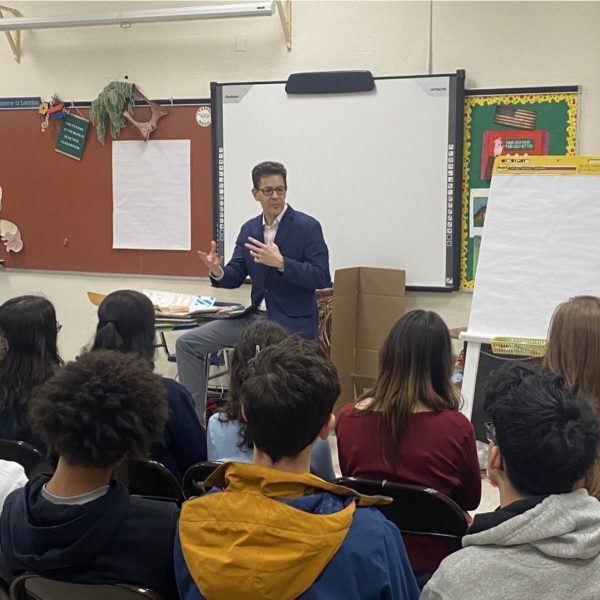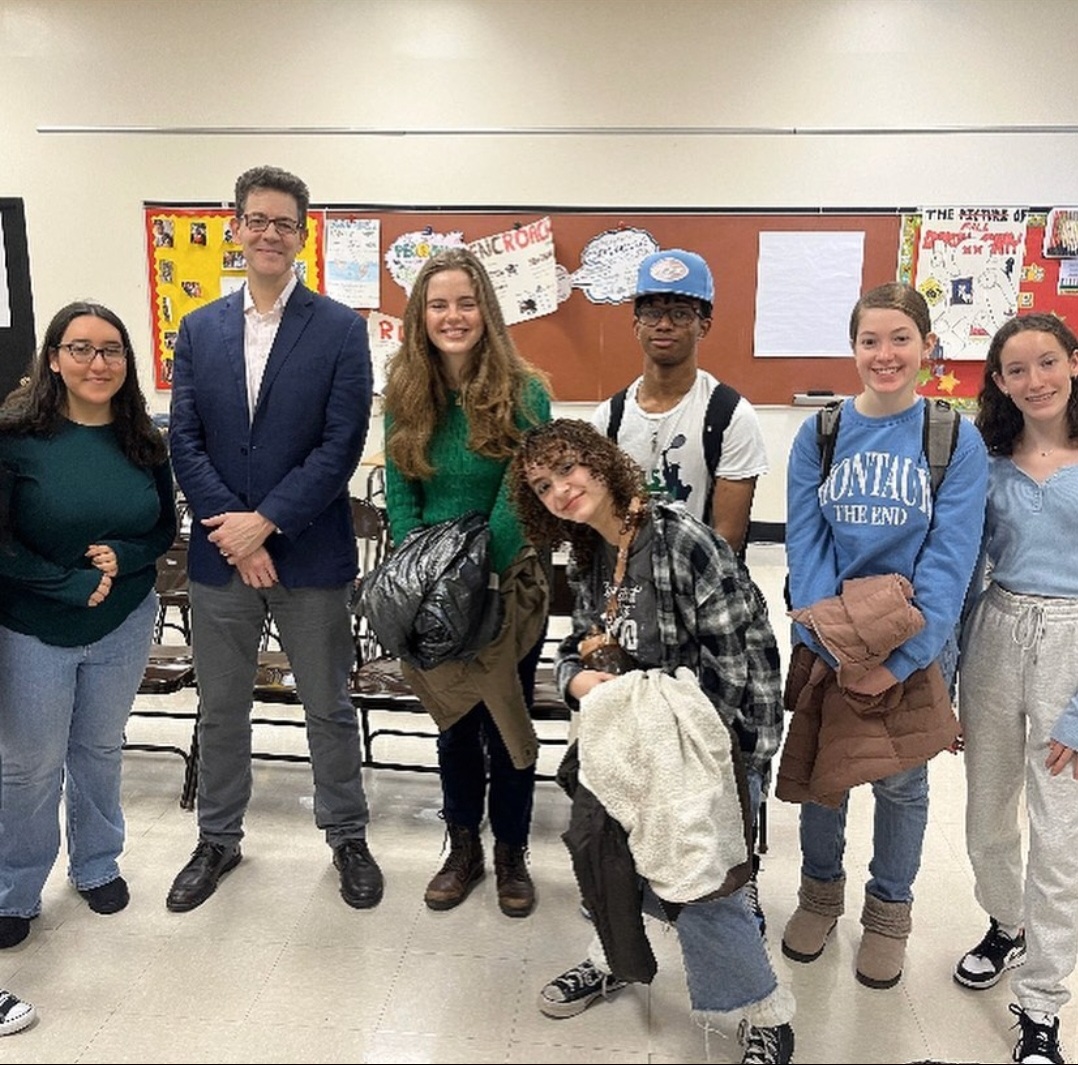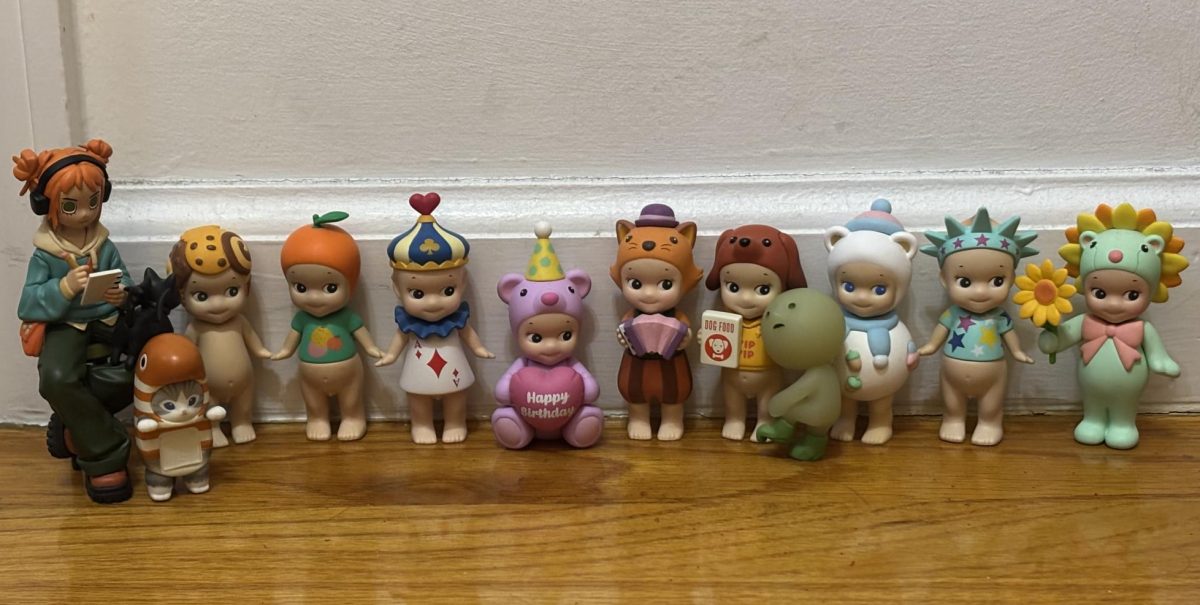English teacher Jessica Sanders’ College Journalism class explores the complexities of working as a journalist in various areas: news reporting, pop culture, sports, and more; therefore, one of the ideal ways to fully comprehend the life of a journalist is to hear from one. Newsday entertainment reporter and film critic Rafer Guzman returned to LHS, this time in person, on Friday, January 12. Having visited virtually via WebEx the last two years, it was both refreshing and exciting for students that Guzman could make an appearance in the flesh. In attendance were Sanders’ journalism students, Horizon writers and editors, and one of Mary Kirby’s English classes.
Guzman earned his graduate degree from Columbia University’s School of Journalism and went on to freelance for many publications before landing the position of a rock critic at Newsday and then eventually procuring a spot as Newsday’s film critic.
Guzman arrived at Room 324 and took a moment to briefly note familiar faces he recognized from the virtual meetings in the years prior. He then settled down and proceeded to take an unconventional approach to guest speaking: skip the background introduction and dive into questioning. Considering that many students were anticipating his visit, there was no shortage of questions to keep the conversation flowing. Guzman addressed questions on varying topics within the film industry: book-based movies, the current state of Marvel cinema, critiquing with bias, CGI in movies, and much more.
Junior Justin Williams is a former journalism student and current sports editor for Horizon; this was his third time hearing from Guzman. When asked what new insight he gained, Williams answered, “I learned about how important it is to adapt to the ever-changing world of journalism. Even though [Guzman] is a film critic and most of my work is sports-related, the same principles apply. As the world changes, sometimes you have to change with it.” For students who have met Guzman more than once, hearing from him again was yet another opportunity to weigh whether journalism is the career for them by asking more questions.
When asked about the difference between the opinion of a viewer versus that of the critic, especially during an age where the majority of the world takes to social media platforms to express its views, Guzman responded, “A critic isn’t a fan who just loves everything. A critic has some perspective, a good deal of knowledge, an open mind, [and] broad taste.” He went on to explain that “a critic’s first loyalty is to the reader,” meaning that a critic holds a responsibility to reserve certain judgements, such as particular admiration for an actor, and critique the film as is. The ultimate goal is to satisfy the consumer’s question: Should I go see this movie?
A hot topic of conversation was the incorporation of computer-generated imagery (CGI) into the film-making process. Guzman said, without reservation, “I don’t like it. I think it never looks real; it always looks obvious. It doesn’t impress or wow me; it never gives me that feeling of wonder. I always think a practical effect has more impact and looks more interesting.” He went on to dissect how the stop-motion animation in films such as King Kong (1933) may not look real but is “expressive and evocative.” Subjectively, CGI’s “attempt to approximate reality” often takes away from the experience the film may have intended to deliver, according to Guzman.

On another topic, students inquired about the day-to-day life and obstacles of a film critic. A main focal point was how to survive writing for a generation that has seemingly developed a newfound sensitivity, one where the public is more swift to attack the thoughts of others. He expressed that there is a sort of “overamped outrage and vindictiveness” present in society now that can hinder a writer’s ability to write and critique. “Hate speech is one thing, of course, but people shouldn’t have to fear for their livelihoods if we voice an opinion,” he expressed. Guzman also did note the flipside: “I do think that the ‘new sensitivity’ is mostly a good thing—we should all be keeping other people’s feelings in mind when we write about issues like race, gender, and so on.” While his generation was definitely one to make more unfiltered, sometimes harsh, jokes, “it’s probably best to let some of that old language go.”
As for what a day’s work in the life of a critic entails, it all differs based on the format of the film. For instance, the increasing dominance of streaming services is competing with the cinema industry. In the previous year, Guzman reviewed Wish and Elemental, movies which can be viewed on the Disney+ platform. Ultimately, there are the “big” and “small” movies. “Big” films are wide releases from major studios and are played in private screening rooms at multiplexes for a long period of time, whereas “small” films are typically limited-releases that are available in fewer cities but in various formats. In essence, Guzman would go to a theater to watch a major film and most likely be sent a link to watch other small-scale popular films at home. Ultimately, “The smaller movies are more anxious to be seen in any format, [and] the bigger movies want to stay big,” he emphasized.
Taking advantage of opportunities to hear from different experts of a field, such as active journalists, can help students gain more awareness as they consider what prospective career paths they would like to pursue. Freshman Ian Fishman remarked, “I think it’s important to take advantage of journalists coming in to talk to us as he or she could give us many important ideas to help us improve our writing skills. A person like Rafer Guzman has been a critic for over 20 years, so his long-term experience and the success of his articles could make our own articles even better.” Firsthand accounts like Guzman’s are a very efficient way for a student to see if a certain career is right for him or her.





















